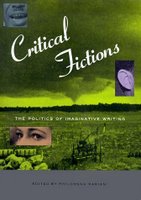
Margaret Atwood’s essay, The Female Body, begins with the wonderfully playful request, “I agree, it’s a hot topic. But only one? Look around, there’s a wide range. Take my own, for instance. I get up in the morning. My topic feels like hell. I sprinkle it with water, brush parts of it, rub it with towels…I dump in the fuel and away goes my topic, my topical topic, my controversial topic, my capacious topic…”
The very idea of a book that has collected essays about the politics of creativity is as provocative and irresistible an idea as Atwood’s invitation above. What would that look like? What does that mean? With the collected works of 41 internationally renowned authors from Zoe Wicomb and Ama Ata Aidoo to James Baldwin and Salman Rushdie, this collection of essays attempts to answer these questions through writings that explore “what it means to be writing from specific race, class and gender positions at a particular historical moment.” Which is to say that is a hopelessly inadequate description to the wonderful diversity and range found here.
This is a good book, with a few really great essays butting heads with feminist theory, poetry, and fiery conference presentations. One of the great things about a book like this, is that one minute you can be thoroughly irritated by the somewhat nonsensical incantation (and embarrassing if you picture it being blasted at a pro-choice rally in DC as it was) by Alice Walker’s The Right to Life: What can the White Man Say to the Black Woman? And the next minute you are sucked in by Philomena Mariani’s evocative and finely wrought essay, God is a Man. Among the noteworthy is my old favorite—Notes of a Native Son—which reminded me again why I love James Baldwin. Here’s an essay (like so many other treasures in this collection) that exemplifies how politics and art can be a formidable force that speaks the truth more loudly and clearly than anything we listen to or read. With exquisite finesse, Baldwin paints for us the racial politics of 1940s America through the lens of a difficult and abusive father. Here’s one of my favorite passages from that essay.
He was, I think, very handsome…Handsome, proud, and ingrown, “like a toenail”, somebody said. But he looked to me, as I grew older, like pictures I had seen of African tribal chieftains: he really should have been naked, with war paint on and barbaric mementos, standing among spears. He could be chilling in the pulpit and indescribably cruel in his personal life and he was certainly the most bitter man I have ever met; yet…buried in him, which lent him his tremendous power and, even, a rather crushing charm. It had something to do with his blackness, I think—he was very black—with his blackness and his beauty, and with the fact that he knew that he was black but did not know that he was beautiful.
Gorgeous. If I had my way, I would be typing out his entire essay.
There’s one more that stands out—a newbie (to me)—Gary Indiana’s Identity Check. A moment that poignantly captures the essence of the entire collection, is when the narrator’s mother discovers his diary and reads the lurid fantasies that her son has been having about his brother’s best friend—a poor, Portuguese teenage boy who lived “literally on the wrong tracks”. Here’s that passage.
She refuses to believe that Eugene’s big, stiff cock is a little boy’s fantasy. She grills me for days, an avenging cop: Where did it happen? How many times? Eager to blame an outsider for “corrupting” me, she cites this episode years later, still convinced of its reality, as the likely “cause” of my homosexuality. That might have been my first intimation of the power of the word…this writing was able to cause an eruption of violent feelings. My imagination altered the state of things in the real world.
The best of the pieces in this collection asks us to reconsider art as the only adequate medium for the truth and the politics of identity. At its worst, there are hysterical outcries against “oppressors” by the “oppressed”—words used too freely, blithely. If you get one of the latter, you can always flip it over and come to this challenge: “Rather than set agendas for various kinds of writing, we can do more than ask of our education system that it encourage the writer to think about how she positions herself in the political space. Reactionary positions may well be reduced, or may not. But readers will have to be prepared for both possibilities.” (Philomena Mariani’s God is a Man)
Indeed.



0 Comments:
Post a Comment
<< Home